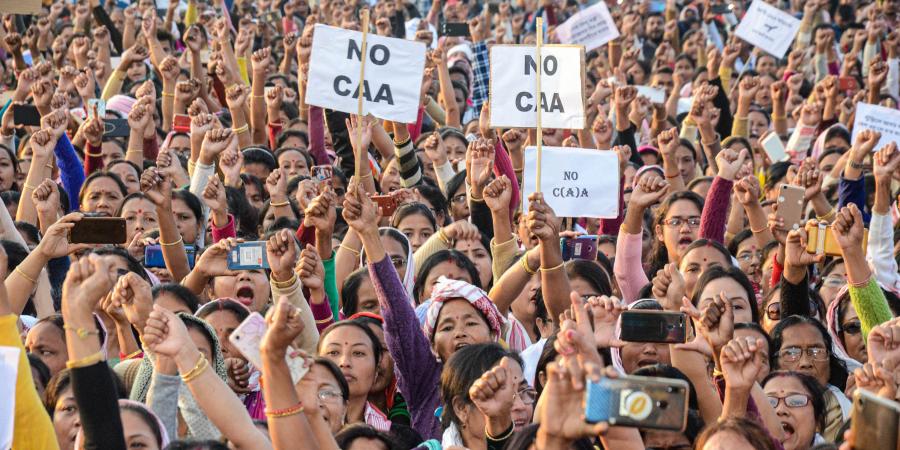
New alliances take shape as Assam approaches polls
Assam is on the cusp of a new political realignment with erstwhile bêtes noires trying to forge an alliance, and the allies becoming adversaries as less than a year is left for the crucial assembly elections.

Assam is on the cusp of a new political realignment with erstwhile bêtes noires trying to forge an alliance, and the allies becoming adversaries as less than a year is left for the crucial assembly elections.
The All Assam Students’ Union (AASU) and Asom Jatiyatabadi Yuva Chhatra Parishad (AJYCP) — formed an 18-member advisory body comprising eminent citizens to decide on floating a political party by the two influential students’ bodies.
It’s a rerun of a similar process that led to the formation of the Asom Gana Parishad (AGP) by the student bodies following the signing of the historic Assam Accord 35 years ago that capped the six-year long anti-foreigner agitation in the state.
The AGP led by student leader-turned politician Prafulla Kumar Mahanta went on to rule the states for two terms from 1985 to 1989 and from 1996 to 2001. But since 2001 the party has been in constant decline, having to withstand several splits and defections. The fateful blow came in March 2014, when its former president Chandra Mohan Patowary and several other senior leaders switched over to the BJP. Earlier in 2011, the party’s emerging youth leader Sarbananda Sonowal too had joined the saffron camp.
Related news: Is China trying to do in NE what Pakistan is doing in Kashmir?
In the subsequent 2014 Lok Sabha elections, the Northeast’s biggest regional party failed to win a single seat, forcing it to contest the 2016 assembly elections as a junior partner of the BJP. The alliance, which had the tacit backing of the state’s two politically influential students’ organisations, came to power under the leadership of Sonowal, who was also a former AASU president.
After the BJP-led government at the Centre enacted the Citizenship (Amendment) Act, 2019, the state government came into direct confrontations with the students organisations that demanded scrapping of the contentious legislation.
The relation came to breaking point earlier this month when the AASU made public a high-level committee’s confidential report on the implementation of 1985 Assam Accord’s Clause 6, which seeks to define the indigenous citizens of the state for the preservation and promotion of Assamese identity and heritage.
While releasing the report, AASU advisor Samujjal Bhattacharya said it was compelled to make the report public as the state and the central governments were sitting over it even though the report was submitted five months ago.
The AASU now feels that the state’s existing political parties, including its offshoot the AGP have failed to protect the interests of the state and hence there is a need for an alternative.
AASU general secretary Lurin Jyoti Gogoi said the AGP had compromised its ideologies for its own benefit and hence there was a need for an alternative.
If the AASU floats a new regional party, it would be a blow for the BJP as well as in the last few elections in the state, a large section of the youth was backing the party, several BJP leaders admit in private.
A split in Assamese Hindu votes between BJP-AGP combine and another regional party would definitely help the Congress, said a senior AGP leader Ramendra Narayan Kalita. In the same breath, he added it would be too early to say what course the AASU would finally take.
“Let’s wait and watch,” he said.
The AGP will assess the emerging political development in its ensuing triennial conference on August 27.
Meanwhile, the state Congress has recommended to its high command to give a nod to stitch a grand alliance with like-minded parties, including the Islamic right-wing the All India United Democratic Front (AIUDF) of cleric-cum-politician Maulana Badruddin Ajmal.
The AIUDF was formed with the backing of the Assam Jamiat Ulema-e Hind in 2005 accusing the Congress of failing to protect the interest of the state’s over 30 per cent Muslim minorities despite the community steadfastly voting for the grand-old party.
Related news: Who is an Assamese? Panel report raises more questions than answers
In the past elections, despite several Congress leaders advocating for an alliance with the AIUDF, the tie up did not materialise due to strong objections from former Chief Minister Tarun Gogoi. But now Gogoi along with another former chief minister Bhumidhar Barman is pushing for the alliance to prevent a split in the minority vote. Assam has 34.22 per cent Muslim population as far the last census.
A minuscule section of the Congress leaders, however, are opposing any alliance with the AIUDF arguing that it would further alienate Assam Hindu voters from the party.
“The alliance will further help to polarise the Hindu votes in favour of the BJP,” said a Congress MLA from upper Assam region, who did not wish to be named

